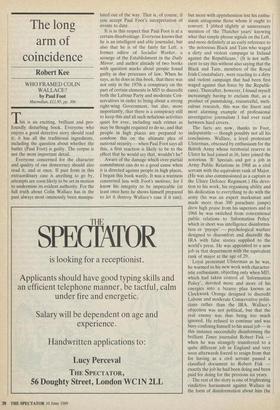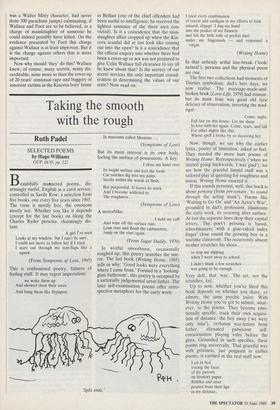The long arm of coincidence
Robert Kee
WHO FRAMED COLIN WALLACE?
by Paul Foot
Macmillan, f12.95, pp. 306
This is an exciting, brilliant and pro- foundly disturbing book. Everyone who enjoys a good detective story should read it; it has all the traditional ingredients, including the question about whether the butler (Paul Foot) is guilty. The corpse is not the most important detail.
Everyone concerned for the character and quality of our democracy should also read it, and at once. If past form in this extraordinary case is anything to go by, attempts are soon likely to be set in motion to undermine its evident authority. For the full truth about Colin Wallace has in the past always most ominously been manipu- lated out of the way. That is, of course, if you accept Paul Foot's interpretation of events to date.
It is in this respect that Paul Foot is at a certain disadvantage. Everyone knows that he is an intelligent and able journalist, but also that he is of the fairly far Left, a former editor of Socialist Worker, a scourge of the Establishment in the Daily Mirror, and author already of two books with question marks about people found guilty in due processes of law. When he says, as he does in this book, that there was not only in the 1970s a conspiracy on the part of certain elements in MI5 to discredit both the Labour Party and moderate Con- servatives in order to bring about a strong right-wing Government, but also, more importantly, that there is a conspiracy still to keep this and all such nefarious activities quiet for ever, including such crimes as may be thought required to do so, and that people in high places are prepared to condone this on the ultimate plea of national security—when Paul Foot says all this, a first reaction is likely to be to the effect that he would say that, wouldn't he?
Aware of the damage which over-partial commitment can do to a good cause when it is directed against people in high places, I began this book warily. It was a wariness concerned less with Foot's motives, for I know his integrity to be impeccable (at least once here he shows himself prepared to let it destroy Wallace's case if it can) but more with apprehension lest his enthu- siasm antagonise those whom it ought to convert. I jibbed slightly at unnecessary mention of 'the Thatcher years' knowing what that simple phrase signals on the Left, and more definitely at an early reference to `the notorious Black and Tans who waged a dirty and violent campaign in Ireland against the Republicans.' (It is Pot suffi- cient to say this without also saying that the Black and Tans, members of the Royal Irish Constabulary, were reacting to a dirty and violent campaign that had been first waged against that force by the Republi- cans). Thereafter, however, I found myself increasingly having to exclaim that, as a product of painstaking, resourceful, meti- culous research, this was the finest and most alarming example of professional investigative journalism I had ever read between hard covers.
The facts are now, thanks to Foot, indisputable — though possibly not all his conclusions. Wallace, a loyal protestant Ulsterman, obsessed by enthusiasm for the British Army whose territorial reserve in Ulster he had joined at 16, later joined the notorious 'B' Specials and got a job in Army Public Relations in 1968 as a civil servant with the equivalent rank of Major. (He was also commissioned as a captain in the Ulster Defence Regiment.) His devo- tion to his work, his organising ability and his dedication to everything to do with the army (he was an expert marksman and made more than 300 parachute jumps) drew high praise from his superiors and in 1968 he was switched from conventional public relations to 'Information Policy' which in short was intelligence disinforma- tion or `psyops' — psychological warfare designed to discomfort and discredit the IRA with false stories supplied to the world's press. He was appointed to a new job in that department with the equivalent rank of major at the age of 29.
Loyal protestant Ulsterman as he was, he warmed to his new work with character- istic enthusiasm, objecting only when MI5, which had taken control of 'Information Policy', devoted more and more of his energies into a bizarre plan known as Clockwork Orange designed to discredit Labour and moderate Conservative politi- cians rather than the IRA. Wallace's objection was not political, but that the real enemy was thus being too much ignored. He refused to continue and was busy confining himself to his usual job — in this instance successfully disinforming the brilliant Times journalist Robert Fisk when he was strangely transferred to a quite different job in England and very soon afterwards forced to resign from that for having as a civil servant passed a classified document to Robert Fisk exactly the job he had been doing and been paid for doing for the previous six years.
The rest of the story is one of frightening vindictive harassment against Wallace in the form of disinformation about him (he was a Walter Mitty character, had never done 300 parachute jumps) culminating, if Wallace and Foot are to be believed, in a charge of manslaughter of someone he could indeed possibly have killed. On the evidence presented by Foot this charge against Wallace is at least unproven. But it is the charge against others that is more important. Now why should 'they' do this? Wallace knew, of course, many secrets, many dis- creditable, none more so than the cover-up of 20 years' continual rape and buggery of innocent victims at the Kincora boys' home in Belfast (one of the chief offenders had been useful to intelligence; he received the lightest sentence of the three men con- victed). Is it a coincidence that the man- slaughter affair cropped up when the Kin- cora scandal did at last look like coming out into the open? Is it a coincidence that the official enquiry into whether there had been a cover-up or not was not prepared to give Colin Wallace full clearance to say all he knew about that? Is the secrecy of our secret services the only important consid- eration in determining the values of our state? Now read on.



























































 Previous page
Previous page